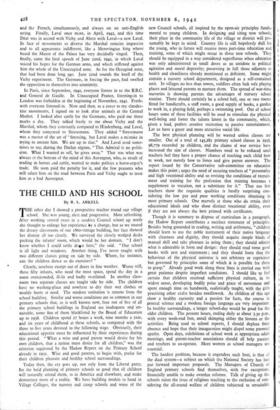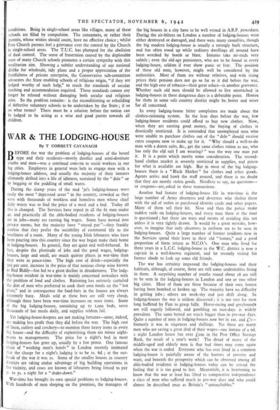THE CHILD AND HIS SCHOOL
By R. L. ARKELL
THE other day I showed a prospective teacher round our village school. She was young, alert and progressive. Most refreshing. After working several years in a modern Council school up north she thought to enlarge her experience lay a change, but as we toured the dreary classrooms of our i86o-vintage building, her face she:1'4)nd her dismay all too clearly. We surveyed the closely wedged desks packing the infants' room, which would be her domain. "I don't know whether I could settle down here," she said. "Our school is all light and windows. Another thing, I've never taught with two different classes going on side by side. Where, for instance, can the children dance or do exercises?"
Clearly, nowhere except out of doors in fine weather. Worse still, these fifty infants, who need the most space, spend the day in a
room overcrowded, and badly ventilated. In another class- room two separate classes are taught side by side. The children have no washing-place and nowhere to dry their wet clothes or muddy boots at need. The outdoor sanitation is remote from the school building. Similar and worse conditions are so common in our primary schools that, as is well known now, four out of five of all the primary school buildings in England are inadequate and un- suitable, some Soo of them blacklisted by the Board of Education up to 1938. Children spend 27 hours a week, nine months a year, and six years of childhood at these schools, as compared with the three to five years devoted to the following stage. Obviously, their educational appetite must be influenced by their experiences during this period. "What a wise and good parent would desire for his own children, that a nation must desire for all children," was the criterion suggested by the Hadow Report on the Primary School already in 1931. Wise and good parents, to begin with, prefer for their children pleasant and healthy school surroundings.
Today then, the cry goes up, not only from the Liberal party, for the bold planning of primary schools so good that all children will naturally attend them, as in America and elsewhere, and make democracy more of a reality. We have building models to hand in Village Colleges, the nursery and camp schools and some of the new Council schools, all inspired by the open-air principles funda- mental to young children. In designing and siting new schools, their place in the community life of the village or district will pre- sumably be kept in mind. Country life is still hopelessly dull for the young, who in future will receive more part-time education and training, some of which might occur in these new schools. They should be equipped in a way considered superfluous when education was only administered in small doses as an antidote to political agitation and moral depravity; possessing in full those adjuncts to health and cleanliness already mentioned as deficient. Some might contain a nursery school department, designed as a self-contained unit. In villages no less than towns, toddlers often lack safe playing places and leisured parents to nurture them. The spread of war-time nurseries is showing parents the advantages of nursery school routine. There should certainly be a school hall, one or two rooms fitted for handicrafts, a staff room, a good supply of books, a garden to work in, a playing field, perhaps a swimming pool. Out of school hours some of these facilities will be used to stimulate the physical well-being and foster the talents latent in the community, which, given a lead, prefers creative recreation to passive entertainment. Let us have a gayer and more attractive social life.
The best physical planning will be wasted unless classes are smaller. Out of a total of 145,281 primary school classes in 1938, 98,779 exceeded 30 children, and the claims of war service have increased the size of classes. Numbers need to be reduced until teachers feel they have a proper chance of teaching each child how to work, not merely how to listen and give parrot answers. The report issued by the Conservative sub-committee on education makes this point ; urges the need of securing teachers of "personality and high vocational ability and so revising the conditions of recruit- ment and training for the profession that training becomes a supplement to vocation, not a substitute for it." That too few teachers show the requisite qualities is hardly surprising con- sidering the low pay and poor working conditions obtaining in most primary schools. One marvels at those who do retain their educational ideals and who show distinct vocational ability, even if they are not always the best primed with certificates.
Though it is summary to dispose of curriculum in a paragraph, the Hadow Report contributes a succinct statement of principles. Besides being grounded in reading, writing and arithmetic, "children should learn to use the noble instrument of their native language with clearness and dignity, they should acquire simple kinds of manual skill and take pleasure in using them ; they should admire what is admirable in form and design: they should read some good books with zest and enjoyment ; and they should learn that the behaviour of the physical universe is not arbitrary or capricious but governed by principles some of which k is possible for them to grasp." Already good work along these lines is carried out with great patience despite imperfect conditions. I should like to feel certain that children received sufficient physical culture, in its widest sense, developing bodily poise and grace of movement and spent enough time on handwork, realistically taught, with the girls practising other crafts besides needlework. As children of this age show a healthy curiosity and a passion for facts, the course in general science and a modern foreign language are very important. In healthy surroundings, a longer school-day would be good for the older children. The present hours, ending daily at about 3.30 p.m., with every week-end free, entail skimping either the lessons or the activities. Being used to school reports, I should deplore their absence and hope that their inauguration might dispel some parental apathy. Open days, exhibitions of school work at appropriate adult meetings, and parent-teacher associations should all help parents and teachers to co-operate. More women as school managers are essential.
The hardest problem, because it engenders such heat, is that of the dual system—a subject on which the National Society has just put forward important proposals. The Managers of Church of England primary schools find themselves, with few exceptions, financially unable to make overdue reforms. Talk of giving up the schools raises the issue of religious teaching to the exclusion of con- sidering the all-round welfare of children subjected to unsuitable conditions. Being in single-school areas like villages, many of these schools are filled by compulsion. The consumers, or rather their parents, whose wishes should count, have no effective choice ; whilst Free Church parents feel a grievance over the control by the Church in single-school areas. The T.U.C. has plumped for the abolition of dual control. The sense of frustration caused by the deplorable state of many Church schools promotes a certain sympathy with this totalitarian aim. Showing a subtler understanding of our national dislike for wholesale, tidy plans and a proper appreciation of the fruitfulness of private enterprise, the Conservative sub-committee advocates the State enabling schools of religious origin, "if they are judged worthy of such help," to reach the standards of secular teaching and accommodation required. These standards cannot any longer be relaxed without damaging both secular and religious aims. So the problem remains: is the reconditioning or rebuilding of defective voluntary schools to be undertaken by the State ; if so on what terms? There must be a solution before the nation can be judged to be acting as a wise and good parent towards all children.



























 Previous page
Previous page